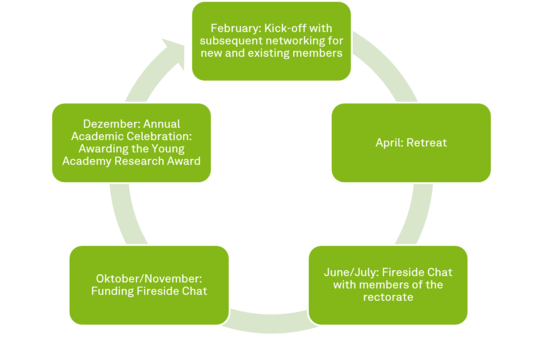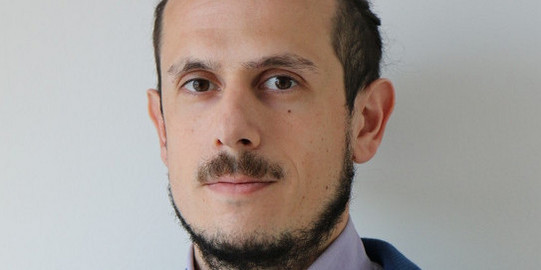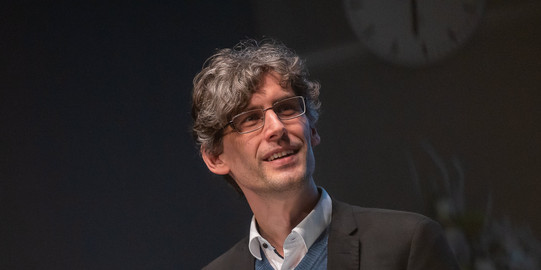TU Dortmund Young Academy
With the Young Academy, TU Dortmund University supports scientists in the qualification phase to become successful in acquiring external research funding.
The TU Dortmund Young Academy includes versatile internal project funding, a research award, and an exclusive event program for all members.
Successful applicants for the project funding or the research prize will become members of the Young Academy. In the Young Academy, you will have access to an exclusive program of events for a period of up to six years.
Young Academy project funding
A maximum of 10,000 euros in funding can be obtained per application.
The funding application may include one or more different modules, but they must be part of the implementation of the same research project. However, no more than three modules should be combined. The following also applies to the combination of modules:
The combination must be indispensable for the successful feasibility of the project. Reasons must be given in the application as to why the project can only be realised with a combination of these modules.
Possible modules are
(A) Small equipment
(B) Support for a scientific workshop/conference organisation
(C) Support by a student assistant, e.g. for publication or preparation of a third-party funding application
(D) Participation in an international conference with an active contribution
(E) Other support needs in the research context
A combination could look like this, for example: The purchase of a small device is necessary for the realisation of a data collection (Module A) as well as support from a student assistant (Module C). An amount of €5,000 is estimated for the purchase and €3,000 for the assistant. A total of 8,000 euros is therefore requested.
The following maximum amounts are proposed for the respective modules (however, deviations in individual cases may be justified):
(A) Small equipment: up to €5,000
(B) Support for workshop/conference organisation: up to €5,000
(D) Support from SHK, e.g. for publication or preparation of third-party funding applications: up to €3,000
(E) Participation in an international conference with an active contribution: up to € 2,500
(F) Other support requirements in the research context: up to €3,000.
The funding must be used for the intended purpose within 24 months of approval.
Scientists with a doctorate at TU Dortmund University below the professorship level.
Applicants enter their data in the application portal and upload the following documents together in one PDF file:
- Project outline (max. 2 pages): This includes a description of the project, indicating the topic and the relevance of the project, as well as any other participants and their tasks in the project. In addition, a time and budget plan is part of the project outline. The budget plan must have been checked beforehand by Dezernat 5.1 (contact persons: Vanessa Hohmann, Dana Gerbersmann). Please be aware that this review will take ten days and plan your schedule accordingly.
- Letter of endorsement from the representatives of the group of scientific employees in the faculty. The faculty council members from the group of scientific employees can endorse up to three applications from their faculty per call. Applicants will have the endorsement letter completed and uploaded with their application materials. Only applications that have been endorsed can be considered.
- Copy of doctoral degree certificate
- CV (DFG form) and list of publications
After the application deadline, all applications received will be reviewed. The selection committee will pre-select applicants who will be invited to present their project. The presentation consists of a 10-minute talk followed by a discussion (also about 10 minutes). After the presentations, the panel deliberates again. Subsequently, the applicants are informed in writing about the approval or rejection of their application.
Reject applicants can apply again. Successful applicants can apply again after completion of the funding.
- 1 Mathematics: https://www.mathematik.tu-dortmund.de/sites/nachrichten-aus-dem-dekanat/fakultaetsrat-mathematik
- 2 Physics: https://physik.tu-dortmund.de/fakultaet/gremien-ausschuesse-und-beauftragte/fakultaetsrat/
- 3 Chemistry and Chemical Biology: no information on the website, please check with the dean's office for current staffing: https://ccb.tu-dortmund.de/fakultaet-ccb/dekanat-ccb/
- 4 Computer Science: https://www.cs.tu-dortmund.de/nps/de/Einrichtungen/Gremien/FR/
- 5 Statistics: https://www.statistik.tu-dortmund.de/dekanat.html
- 6 Biological and Chemical Engineering: no information on the website, please inquire at the dean's office for current staffing: https://bci.tu-dortmund.de/fakultaet/gremien-und-beauftragte/fakultaetsrat/
- 7 Mechanical Engineering: no information on the website, please check with the dean's office for current staffing: https://www.mb.tu-dortmund.de/cms/de/Fakultaet/Ansprechpartner/Dekanat/index.html
- 8 Electrical Engineering and Information Technology: http://www.fset.e-technik.tu-dortmund.de/cms/de/Gremien/Fakultaetsgremien/index.html
- 9 Spatial Planning: https://raumplanung.tu-dortmund.de/fakultaet/gremien/fakultaetsrat/
- 10 Architecture and Civil Engineering: https://www.bauwesen.tu-dortmund.de/haupt/de/Fakult__t/Gremien-_-Beauftragte/index.html
- 11 Business and Economics: no information on the website, please inquire at the Dean's Office for current staffing: https://wiwi.tu-dortmund.de/fakultaet/zentraleeinrichtungen/dekanat/
- 12 Educational Sciences and Psychology: no information on website, please check with Dean's Office for current tenure: https://ep.tu-dortmund.de/fakultaet/fakultaetsleitung/geschaeftsfuehrung/
- 13 Rehabilitation Sciences: https://reha.tu-dortmund.de/fakultaet/gremien-und-beauftragungen/fakultaetsrat/
- 14 Humanities and Theology: no information on website, please check with Dean's office for current tenure: https://ht.tu-dortmund.de/fakultaet/dekanat/
- 15 Cultural Studies: https://www.kulturwissenschaften.tu-dortmund.de/cms/de/01_Fakultaet/03_Gremien/04_Fakultaetsrat/index.html
- 16 Arts and Sport Sciences: http://www.fk16.tu-dortmund.de/dekanat/de/Fakultaet/Fakultaetsrat/index.html
- 17 Social Sciences: https://sowi.tu-dortmund.de/fakultaet/gremien-und-beauftragte/gremien/fakultaetsrat/
The project funding is announced once a year. The deadline is 30th November.
The committee evaluates the scientific quality of the applications, the relevance of the proposed project for the applicant's research and for the research at TU Dortmund University. In addition, there should be an appropriate relationship between the use of funds and the expected return.
In your application, briefly and precisely describe the expected gain in knowledge of your research project, its innovativeness or the gap that it will close, the significance of the project for the development of your own research profile and, if applicable, the connectivity to the profile areas of TU Dortmund University or the significance of your research for the profile of TU Dortmund University.
The committee consists of three proven young scientists from different faculties, who have already acquired high-caliber third-party funding, headed a junior research group or held a junior professorship:
The panel is chaired by the Prorector for Research, Prof. Dr. Nele McElvany (without voting rights).

Scientists whose funding application has been approved or who have received the Young Academy Research Award become members of the Young Academy for up to 6 years. This gives them access to an exclusive accompanying program that supports them in building up a profile with strong third-party funding. This program consists of workshops, retreats, fireside evenings with the Rectorate, and peer mentoring opportunities.
Attendance at the events in the support program is mandatory. In the first two years, each element (kick-off workshop, theme workshop, retreat, fireside evening, introduction to peer mentoring) must be completed once. In the next four years, participation in all elements (except the kick-off workshop) is optional.
Projects Funded by the Young Academy
- Dr. Lukas Baumanns (Mathematics) | MusterBlick – Eye-Tracking-Untersuchungen zur Förderung von Erstklässler*innen bei Musterfolgeaufgaben
- Dr. Justine Stang-Rabrig (Educational Sciences and Psychology) | Stereotype Threat-Effekte auf Wortschatz, Motivation, Emotion und Wohlbefinden bei Studierenden (FOCUS)
- Dr. Veronique Wolter (Fine Arts) | Einfluss sozialer Determinanten auf die Schwimmfähigkeit von Kindern im Grundschulalter
- Dr. Victor Medina-Olivares (Statistics) | Unveiling the Links: Time-Varying Copulas for Joint Models of Longitudinal and Survival Data
- Dr. Alina Schmitz (Social Sciences) | Bildungsaufstieg aus benachteiligten Milieus: Auswirkungen auf Lebensverläufe und das mentale Wohlbefinden im Generationenkontext
- Dr. Ulrich Ludewig (Educational Sciences & Psychology) | Folgen der COVID-19-Pandemie auf die Lesekompetenz von Grundschülerinnen und Grundschülern im europäischen Vergleich
- Dr. Jonas Rieger (Statistics) | The Era of ChatGPT: Evaluation and Regulation of Large Language Models
- Dr. Sheena Shah (Cultural Studies) | The making of the first-ever siPhuthi-Sesotho-English dictionary
- Dr. Holger Stevens (Physics) | Dosismessungen mit Diamantsensoren im Bragg-Peak der Protonentherapie
- Dr. Jasmin Trächtler (Humanities & Theology) | fem.wis - Standpunkte aus der feministischen Erkenntnis- und Wissenschaftstheorie
- Dr. Sina Trebing (Arts & Sports Sciences) | Einfluss einer mehrwöchigen präoperativen Trainingsintervention auf die Immunzellinfiltration im Darmgewebe von Patient*innen mit kolorektalem Karzinom - eine randomisierte kontrollierte Studie
- Dr. Susanne Dogan-Surmeier (Physics) | In-situ study of the influence of perfluorocarbons on model membranes and membrane-protein interactions
- Dr. Jan-Hendrik Herbst (Humanities and Theology) | Erstellen eines quantitativen Fragebogens zu ‚Kontroversität‘ für Religionslehrkräfte als Instrument des purposiven Samplings für eine qualitative Folgestudie
- Dr. Yury Kutin (Chemistry and Chemical Biology) | Structure elucidation of substrate binding to highly-efficient metalloDNAzymes
- Dr. Dahae Lee (Spatial Planning) | Co-production
- Dr. Katharina Limbach (Rehabilitation Science) | Schau Dir das Gesicht an—diesmal aber ECHT!
- Dr. Alexander Röhm, Dr. Nurit Viesel-Nordmeyer & Dr. Eva Wimmer (Rehabilitation Science) | Metaanalyse zum Zusammenhang grammatischer Fähigkeiten und mathematischem Lernen (MetaGraM)
- Dr. Marcus Schmidt (Arts and Sport Sciences) | Verletzungsprävention und Steigerung der Leistungsfähigkeit von Sportlerinnen mittels
Künstlicher Intelligenz - Dr. Manuela Vida-Mannl (Cultural Studies) | English in tourism and beyond: Multilingual encounters in international contexts in Croatia
- Dr. Jan C. Watzlawik (Arts and Sport Sciences) | Prestudy: Unboxing the Unexplored. Für eine grundlegende Erschliessung, Digitalisierung sowie Erforschung des modefotografischen Archivs von Angelica Blechschmidt
- Dr. Giovanni Zamborlini (Physics) | Nontrivial topology in conjugated 2D molecular frameworks
- Dr. Raffael Beier (Spatial Planning) | Afterlives of subsidised housing provision in Mashhad, Iran
- Dr. Paul Eisewicht (Social Sciences) | Social Curation
- Jprof. Anne Hangebruch (Architecture and Civil Engineering) | Massiv Bauen mit Naturstein heute
- Dr. Raja Herold-Blasius (Mathematics) | ProStragIn: Mathematisches Problemlösen mit Strategieschlüsseln bei inklusiven Schüler:innen fördern
- Dr. Niklas Joisten (Art & Sport Sciences) | Akuteffekte einer einmaligen körperlichen Ausbelastung auf systemische Tryptophanmetabolitlevel: Eine randomisierte cross-over Studie
- Dr. Luise von Keyserlingk (Educational Sciences and Psychology) | Optimierung von Lehr- und Lernprozessen durch die Nutzung digitaler Verhaltensspuren in der Hochschullehre (digiVL)
- Dr. Isabel Neitzel (Rehabilitation Sciences) | Open Data-Projekt: Transkriptbereitstellung auf Childes
- Dr. Steve Schlegel (Humanities and Theology) | Erfolgsanalyse der Friedensimplementierung nach innerstaatlichen Konflikten als Pilotstudie
zur Anwendung der Qualitative Comparative Analysis (QCA) für die Friedens- und Konfliktforschung - Dr. Ramona Thümmler (Rehabilitation Sciences) | Familiäre Interaktionsprozesse (FIP) – Eltern-Kind-Interaktionen videobasiert analysie-
ren, verstehen und verbessern - Dr. Lukas Wojarski (Mechanical Engineering) | Untersuchung des Potentials von Komposit-Pulvermischungen aus hochentropischen Legierungen als Alternative für Nickelbasislote
Submit application
Apply for your funding now using the application form.
Research Award of the Young Academy
The TU Dortmund Young Academy Research Award honors outstanding research contributions by scientists with doctorates below the level of full professorship. The prize is awarded once a year to up to two winners at the annual academic celebration. It is endowed with 2,500 euros, which must be spend for research purposes. Award winners automatically become members of the TU Dortmund Young Academy. As a member of the Young Academy, you will have access to the exclusive range of events for a period of up to six years. The call for applications open annually during summer.
Questions?
If you have any questions about funding, the research award, the application process, or the Young Academy's program of events, Dr. Maria Verena Peters will be happy to help.
Outstanding post-doctoral research consisting of one or two publications that are not older than three years. It must be an independent research contribution (co-authorships are not excluded - in this case, please clearly mark your contribution to the overall project). Dissertation papers cannot be submitted.
PhD scientists below the full professorship level are eligible to apply. The application is done as a self-application.
- High scientific quality
- High (internat.) visibility of the research work (e.g. frequency of call, citation, public perception, presentation at (internat.) conferences, etc.)
- Relevance (to society as a whole, to TU Dortmund research, ...)
- Relevance to third-party funding (was the research financed with third-party funding or did it serve to attract third-party funding?)
Please use your explanatory letter to make the significance of the publication transparent to a non-specialist audience.
In a one-step process, the Young Academy committee selects up to two contributions. The committee consists of three proven young scientists from different faculties, who have already acquired high-caliber third-party funding, headed a junior research group, or held a junior professorship:
The panel is chaired by the Prorector for Research, Prof. Dr. Nele McElvany (without voting rights).
The call for applications is open annually from summer to fall, and the prize will be awarded at the annual academic celebration.
The annual deadline is 30th September.

Scientists who have received the Young Academy Research Award or whose funding application has been approved become members of the Young Academy for up to 6 years. This gives them access to an exclusive accompanying program that supports them in building a profile with strong third-party funding. This program consists of workshops, retreats, fireside evenings with the Rectorate, and peer mentoring opportunities.
Attendance at the events in the support program is mandatory. In the first two years, each element (kick-off workshop, theme workshop, retreat, fireside evening, introduction to peer mentoring) must be completed once. In the next four years, participation in all elements (except the kick-off workshop) is optional.




![[Translate to English:] Schulte-Linnemann / TU Dortmund [Translate to English:] Schulte-Linnemann / TU Dortmund](/storages/graduiertenzentrum/_processed_/9/f/csm_Grafik_Pfeile_3000x666px_a76e54afed.jpg)

